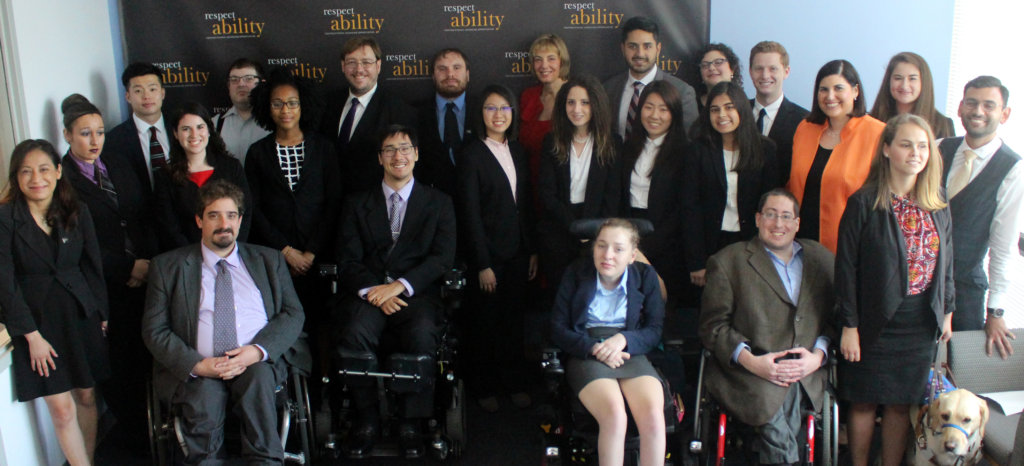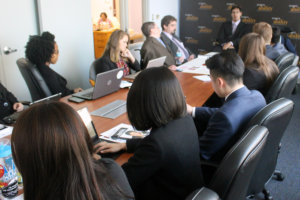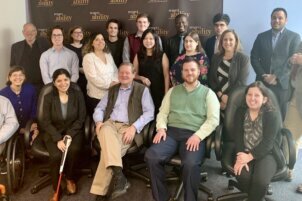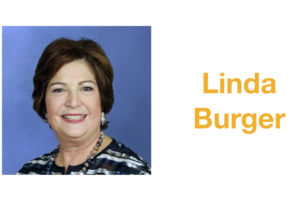Randall Duchesneau Provides Imperative Information and Advice for Disability Advocates

Randy Duchesneau with RespectAbility Fellows and Staff
Rockville, Md., July 1 – With a great smile and warm-hearted tone of voice, Randall “Randy” Duchesneau was quick to capture the attention of RespectAbility Fellows last month. His empathetic persona, brilliance and prominent leadership skills truly reflected on his work as a disability activist.
Duchesneau is on the board of advisors for RespectAbility where he previously served as the National Leadership Program Director. His journey as a disability advocate started after he acquired a spinal cord injury that left him with quadriplegia at the age of 21.
Despite facing challenges with health care and the personal complications that come from depending on personal assistance to survive, Duchesneau has used his experience to help others. He is working toward improving the quality of life of people with disabilities, like himself.
Through his talk, Duchesneau focused on two critical topics involving people with disabilities: Attendant Care Services covered by Medicaid and awareness of the role ethnicity and culture can play in developing community among people with disabilities.
The Issue with Medicaid

Randy Duchesneau speaking to RespectAbility Fellows
Duchesneau provided an overview of the health care insurance system in the United States, which includes both Medicare and Medicaid. He defined Medicare as a federal health insurance for individuals who are 65 and also for people under 65 with disabilities. Medicaid, on the other hand, is both federally and state funded and serves several populations, including those with disabilities, who have low income. Currently, Americans who depend on Medicaid are alarmed because of pending legislation that would drastically cut and reform Medicaid programs. However, there is another issue that jeopardizes receiving services provided by Medicaid.
Personal care assistance services can cost a substantial amount of money to those who require help to complete daily tasks, such as eating, dressing and bathing. This service can be a huge financial burden for anyone who depends on it and pays for it out-of-pocket, with costs easily reaching $80,000 a year. As a result, many people cannot afford these medical expenses on their salary alone and spend down all of their assets to become eligible for Medicaid.
One big issue with Medicaid is the barrier that results from the salary a person makes. In other words, the system encourages individuals not to work in order to receive services. Anyone who takes on a job risks losing their Medicaid services, even if the salary won’t be able to cover the cost of their health needs. This system makes it impossible for someone to progress and take steps toward independence and self reliance; instead, it traps them in poverty.
Duchesneau suggests that policy makers find common ground where both the economy and people can benefit from the system. “We should reform the health care system so that it aligns with incentives to work, because it doesn’t make sense for a person with a disability to finally get a job, only to lose the healthcare services they need to get them up and ready for work in the morning,” he said.
The Value of Cultural Competence
As an active mentor for individuals with a spinal cord injury, Duchesneau said his personal disability is not the only entity that people have used to connect with him. Being part of a minority ethnic group makes him part of a small number of advocates with a Korean background who have a spinal cord injury, leaving people with a Korean background with limited access to people they can culturally relate to.
“After this, I am going to meet with a Korean man who feels most comfortable speaking to someone who also is Korean and has a spinal cord injury,” Duchesneau said.
Culture plays a big role in our life. We naturally feel most comfortable with people we can relate to and who can understand us more deeply, he explained. Unfortunately, people with disabilities who are part of ethnic minority groups do not always have access to service professionals to whom they can relate.
Duchesneau left RespectAbility fellows with a strong desire to become multicultural and empathetic, which are among the many attributes that make him such a great advocate.
JOIN OUR TEAM!
RespectAbility is a nonprofit organization fighting stigmas and advancing opportunities for and with people with disabilities. Learn more about the National Leadership Program and apply for the next cohort! Contact BenS@RespectAbility.org for more information.
ALL FELLOWSHIP OPPORTUNITIES
- PUBLIC POLICY/EMPLOYMENT
- COMMUNICATIONS/DIVERSITY IN FILM & TELEVISION
- NONPROFIT MANAGEMENT
- COMMUNITY OUTREACH/GRASSROOTS ORGANIZING
- JEWISH INCLUSION








